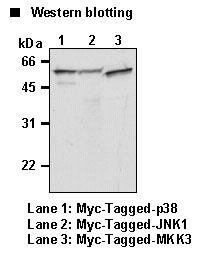References
Yabuta, N., et al., Nucleic Acid Res. 34, 4878-4892 (2006)
Segawa, Y., et al., PNAS. 103, 12021-12026 (2006)
Nagamori, I., et al., J. Biol. Chem. 281, 15073-15081 (2006)
Sato, M., et al., FEBS J. 272, 6131-6144 (2005)
Tsuda, H., et al., Clin. Cancer. Res. 11, 6880-6888 (2005)
Yamashita, M., et al., J. Biol. Chem. 280, 29409-29419 (2005)
Morizane, Y., et al., J. Biochem. 137, 125-132 (2005)
Kojma, Y., et al., J. Biol. Chem. 279, 54032-54038 (2004)
Morikawa, H., et al., Mol. Cell Biol. 24, 9401-9413 (2004)
Muraki, M., et al., J. Biol. Chem. 279, 24246-24254 (2004)
Turan, K., et al., Nucleic Acid Res. 32, 643-652 (2004)
Hirota, K., et al., J. Biol. Chem. 278, 13056-13060 (2003)
Tojo, M., et al., J. Biol. Chem. 277, 46576-46585 (2002)
Ohya, T., et al., J. Biol. Chem. 277, 28099-28108 (2002)
Sasaki, A., et al., J. Biol. Chem. 277, 22541-22546 (2002)
Hamazaki, Y., et al., J. Biol. Chem. 277, 455-461 (2002)
Nishida, T., et al., J. Biol. Chem. 276, 39060-39066 (2001)
Fukumoto, T., et al., J. Biol. Chem. 276, 38441-38448 (2001)
Yoshioka, K., et al., PNAS. 98, 7617-7622 (2001)
Mukai, J., et al., J. Biol. Chem. 275, 17566-17570 (2000)
Yoshizawa, T., et al., Hum. Mol. Genet. 9, 69-78 (2000)
Itoh, M., et al., J. Biol. Chem. 274, 5981-5986 (1999)




